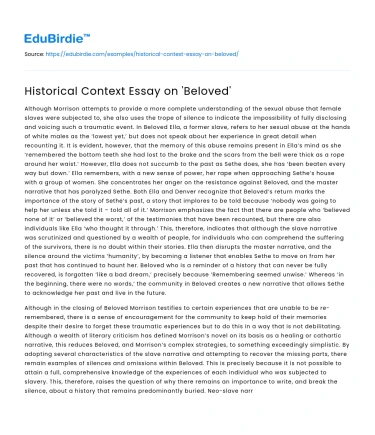Although Morrison attempts to provide a more complete understanding of the sexual abuse that female slaves were subjected to, she also uses the trope of silence to indicate the impossibility of fully disclosing and voicing such a traumatic event. In Beloved Ella, a former slave, refers to her sexual abuse at the hands of white males as the ‘lowest yet,’ but does not speak about her experience in great detail when recounting it. It is evident, however, that the memory of this abuse remains present in Ella’s mind as she ‘remembered the bottom teeth she had lost to the brake and the scars from the bell were thick as a rope around her waist.’ However, Ella does not succumb to the past as Sethe does, she has ‘been beaten every way but down.’ Ella remembers, with a new sense of power, her rape when approaching Sethe’s house with a group of women. She concentrates her anger on the resistance against Beloved, and the master narrative that has paralyzed Sethe. Both Ella and Denver recognize that Beloved’s return marks the importance of the story of Sethe’s past, a story that implores to be told because ‘nobody was going to help her unless she told it – told all of it.’ Morrison emphasizes the fact that there are people who ‘believed none of it’ or ‘believed the worst,’ of the testimonies that have been recounted, but there are also individuals like Ella ‘who thought it through.’ This, therefore, indicates that although the slave narrative was scrutinized and questioned by a wealth of people, for individuals who can comprehend the suffering of the survivors, there is no doubt within their stories. Ella then disrupts the master narrative, and the silence around the victims ‘humanity’, by becoming a listener that enables Sethe to move on from her past that has continued to haunt her. Beloved who is a reminder of a history that can never be fully recovered, is forgotten ‘like a bad dream,’ precisely because ‘Remembering seemed unwise.’ Whereas ‘in the beginning, there were no words,’ the community in Beloved creates a new narrative that allows Sethe to acknowledge her past and live in the future.
Although in the closing of Beloved Morrison testifies to certain experiences that are unable to be re-remembered, there is a sense of encouragement for the community to keep hold of their memories despite their desire to forget these traumatic experiences but to do this in a way that is not debilitating. Although a wealth of literary criticism has defined Morrison’s novel on its basis as a healing or cathartic narrative, this reduces Beloved, and Morrison’s complex strategies, to something exceedingly simplistic. By adopting several characteristics of the slave narrative and attempting to recover the missing parts, there remain examples of silences and omissions within Beloved. This is precisely because it is not possible to attain a full, comprehensive knowledge of the experiences of each individual who was subjected to slavery. This, therefore, raises the question of why there remains an importance to write, and break the silence, about a history that remains predominantly buried. Neo-slave narratives remain important precisely because victims of slavery were silenced for so long by the inscriptions of the master narrative and by the trauma of their own experiences. Morrison, through Beloved, therefore, emphasizes the importance of remembering the suffering of these individuals because they, themselves, found it too painful to voice and those who inflicted this trauma upon them thrived on their continued silence. Morrison, instead, emphasizes the struggles of voicing a traumatic experience and how this remains covered within the slave narrative but can be seen in other documents, such as Jacobs’s letters. Therefore, rather than reading Morrison’s narrative as a form of “healing” or under the assumption that she is claiming to be able to effectively speak for those who are silenced. Morrison’s narrative is more concerned with the survival of individual, and communal, spirit in the face of inhumane situations, and the fact that the silence will remain.
Save your time!
We can take care of your essay
- Proper editing and formatting
- Free revision, title page, and bibliography
- Flexible prices and money-back guarantee






 Stuck on your essay?
Stuck on your essay?

